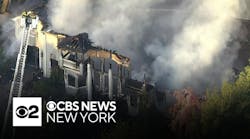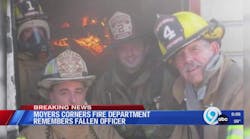NEW HAVEN, Conn. -- If the city excludes most white "gum balls" from competing to be firefighters, it could get sued and potentially cost taxpayers millions of dollars.
That analogy, by a lawyer hired by the city, didn't play well recently among aldermen and minority leaders.
But after seeking outside legal analysis, the administration has decided not to limit applications for the fire service to only city residents or to pursue other civil service alternatives that could help city residents land the coveted jobs -- saying that would place the city in the cross hairs of costly litigation.
"We're always getting sued for something in this city, and you're telling me we're not willing to take a risk for our own residents and for minorities, which is what this is really about," said Jacqueline James Evans, a Hill neighborhood alderwoman and New Haven Democratic Town Committee chairwoman.
The lively debate occurred at a recent aldermanic briefing in City Hall. The short-staffed Fire Department wants to hire people, and the city has been considering ways to give residents some additional advantage in the hiring process.
Can the city, like Hartford has done, limit applications to just its residents? Should the city cap the number of applications it will accept and set aside half for residents? Could the administration give more than the existing 5-percentage-point bonus on residents' hiring tests?
Lawyers for the city said it would do so at its own peril, considering that federal law prohibits race-based hiring. Some aldermen and minority civic leaders wanted a second opinion.
City officials talked not only about what they won't do, but also what they plan to do to give residents some advantage.
Assistant Fire Chief Patrick Egan said engine companies would go door-to-door to inform people that the department is hiring.
The city is collaborating with Gateway Community College to create week-long classes to help residents prepare for the written section of the entry-level test, and is working with several gyms to create a training regimen to help residents prepare for the physical agility test. Those support sessions would be open only to city residents.
And city Chief Administrative Officer Rob Smuts, who at the briefing often found himself in the cross hairs of vocal minority advocates, pushed back and challenged aldermen to run the recruitment drive like the political campaigns that helped them get elected: Go door-to-door, seek out people interested in the fire service, direct them to the services that could give them an advantage in landing the fire jobs.
For the minority advocates, that sounded fine, but many wanted more. Young people of color in the city need and want jobs, but often in the fire service the hiring pool is saturated by white out-of-towners, they said.
The city had examined Hartford's model. It has an informal policy where it will sometimes open applications for the fire department only to city residents.
Attorney Steven Ecker, who was hired to advise New Haven, said the policy in Hartford was unsuccessfully challenged some time ago, and never under Title VII of the federal civil rights statute.
If it was, he said, it would be an expensive "crap shoot" on whether it would win.
And he predicted New Haven likely would face a lawsuit if it enacted a similar policy given the local firefighter promotions case, Ricci vs. DeStefano, that reached the U.S. Supreme Court and made national headlines.
"This is not a situation New Haven wants to face in court. There are people who have their eyes on New Haven. There will be people who will bring suit against the city tomorrow if this passes," he advised.
That's where his analogy came in.
Federal law requires hiring to be race neutral. No one group can be favored based on race, and to exclude predominantly white suburbs from the process could -- under the law -- do just that, he said.
He characterized New Haven as a gum ball machine full of multi-colored gum balls. The machines in the other towns are filled with mainly white gum balls, he said.
Under the law, the problem arises, he said, if a challenge is brought to a policy of hiring only city residents and an analysis shows that the pool of eligible candidates differs statistically from the broader labor pool of Greater New Haven or even statewide. Right or wrong, he said, that is the law.
"I don't like the gum ball analysis because these are real human beings," said the Rev. Scott Marks, a community activist.
Hartford is not being sued, he noted.
"Build a fire department that looks like the city of New Haven. We don't have qualified folks? I don't believe that."
Ecker apologized if the analogy offended but defended his legal analysis. When advocates questioned whether the city should seek a second opinion, Ecker said that it could, but believed "10 out of 10" lawyers would draw the same conclusion.
The alternative is to roll the dice and have some "pointy-head guy with a calculator" take the witness stand and testify that, based on race, there is a statistical disparity of 6.2 percent of eligible candidates "and you lose."
"Taking a chance is great," he said, "but why not make it a smart chance."
Copyright 2012 - New Haven Register, Conn.
McClatchy-Tribune News Service





